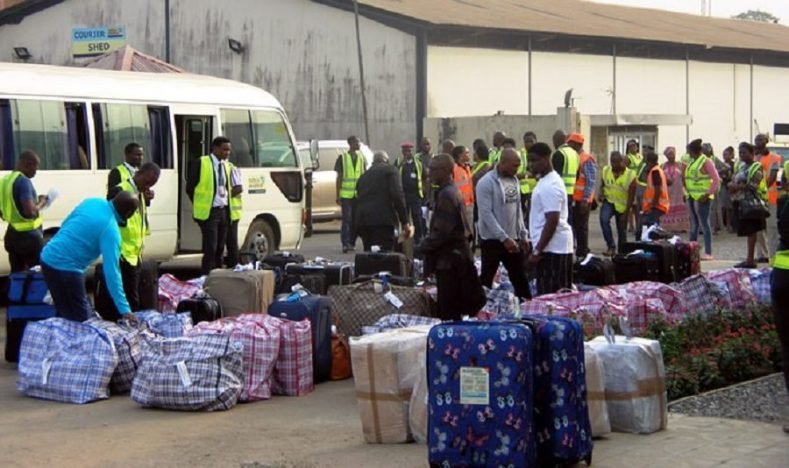The United States Immigration and Customs Enforcement (ICE) has deported 902 Nigerians since the 2019 fiscal year, data from the agency’s 2024 Annual Report reveals.
An additional 3,690 Nigerians remain under removal orders but have yet to be expelled.
Although annual removals of Nigerians declined by 51.7 per cent over six years—from 286 in 2019 to 138 in 2024—ICE’s deportation records indicate spikes during Donald Trump’s early presidency in 2018 and 2019. Officials anticipate another potential surge in 2025 amid renewed enforcement efforts.
Among African nations, Nigeria accounted for the largest number of U.S. deportations.
Senegal followed with 716 removals, 410 of which occurred in 2024 alone. Ghana ranked third with 582 deportations, and Mauritania came close with 491 removals. Mauritania, notably, witnessed a sharp rise from 58 deportations in 2023 to 353 in 2024.
The ICE report linked the increases to the Electronic Nationality Verification (ENV) programme, which sped up the documentation process. By enabling consular officers to conduct identity verification electronically rather than in person, officials said the ENV “cut manifest-approval times from weeks to days and allowed weekend-chartered flights” to countries such as Mauritania, Senegal, and Ghana.
Other African countries with significant deportation figures include Egypt (467), Somalia (406), the Democratic Republic of Congo (395), Liberia (379), Kenya (335), and Guinea (294). Angolans (293), Cameroonians (288), Gambians (22), Sierra Leoneans (165), Moroccans (161), and Ethiopians (141) made up the remainder.
Beyond Africa, ICE reported the highest deportations to nearby countries. Mexico topped the list with 434,827 removals between 2019 and 2024—more than double any other nationality.
Deportations also remained high across the Northern Triangle: Guatemala recorded 185,713 expulsions, Honduras 142,349, and El Salvador 65,268 during the same period.
Colombia saw 30,724 returns and Ecuador 26,847, largely fueled by an increase in charter flights in 2023. Peru (11,554), the Dominican Republic (13,904), Nicaragua (13,350), and Venezuela (4,962) also recorded substantial figures.
Together, these 10 countries made up almost three-quarters of the 271,484 individuals ICE deported in 2024, its busiest year since the onset of the COVID-19 pandemic.
ICE maintained that the legal authority for these removals is rooted in the Immigration and Nationality Act, citing reasons such as unlawful entry, visa overstays, fraud, criminal convictions, or national security threats.
In January 2017, then-President Donald Trump signed Executive Order 13768, broadening ICE’s enforcement scope to target “anyone without lawful status.” ICE arrest numbers jumped 30 per cent that year, corresponding with a rise in Nigerian deportations.
ICE carried out 267,258 removals in 2019—the highest figure in nearly a decade—during which Nigerian deportations peaked at 286. This was part of the 3,690 Nigerians listed on ICE’s non-detained docket by late 2020.
At that time, Nigeria had the second-highest number of African nationals facing deportation, behind Somalia’s 4,090 cases.
Under President Joe Biden, ICE shifted focus in 2021 to prioritize serious criminals and recent entrants, causing removal figures to plummet. ICE recorded about 59,000 removals that year, the lowest in decades, with only 78 Nigerians deported.
In 2022, removals dropped even further, with just 49 Nigerians sent home, due to pandemic restrictions and cautious enforcement. However, following a July 2024 Supreme Court decision allowing full reinstatement of Biden’s enforcement guidelines, deportations have again risen, targeting mainly public safety and national security risks.
ICE defines a “removal” as the confirmed, compulsory expulsion of a non-citizen after a final order by an immigration judge or administrative processes such as expedited removal at the border.
The deportation process involves navigating local jails, immigration courts, and securing consular clearances. ICE noted that electronic verification has sped up the timeline, contributing to the high 2024 deportation figures.
Recently, Immigration and Customs Enforcement agents carried out multiple raids in response to Trump’s deportation directive, arresting suspected illegal immigrants at various locations.
At a February meeting with U.S. Ambassador to Nigeria, Richard Mills Jr., Nigeria’s Minister of State for Foreign Affairs, Ambassador Bianca Odumegwu-Ojukwu, called for a more humane approach to deportations.
“We are asking as a country whether they will be given ample time to handle their assets or will they just be bundled into planes and repatriated?” she queried, highlighting concerns over the emotional and financial impact on deportees and their families.
She emphasized that deportations should not be abrupt or traumatic, especially for individuals with no record of violent crime.
In anticipation of mass deportations, the Nigerians in Diaspora Commission (NiDCOM) assured it was ready to receive returnees.
“The Federal Government has set up an inter-agency committee, comprising the Ministry of Foreign Affairs, NiDCOM, Ministry of Humanitarian Affairs and Office of the National Security Adviser, should there be mass deportation of Nigerians from the US,” said NiDCOM’s Director of Media and Corporate Affairs, Abdur-Rahman Balogun, during an interview.











